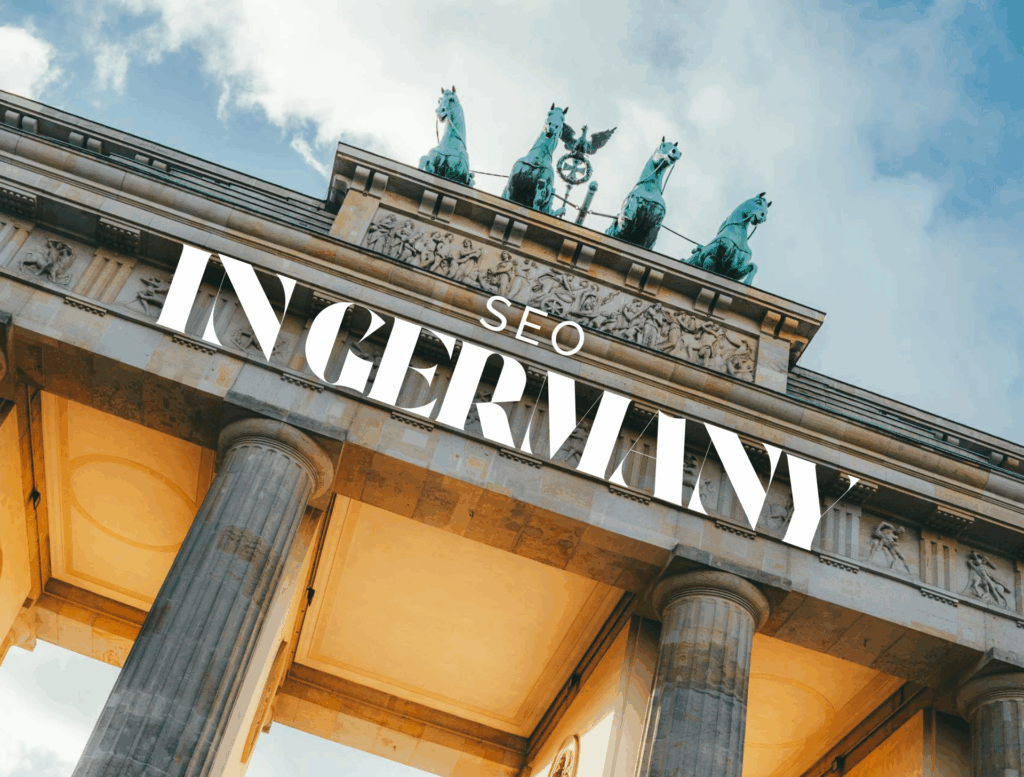Por qué el SEO en Alemania requiere una precisión inquebrantable
- 22 de octubre de 2025
- Últimos artículos sobre tendencias y consejos SEO, SEO local
Tanto en Alemania como en Europa en general, Google domina abrumadoramente el tráfico de búsqueda. Google tiene aproximadamente Cuota de mercado del 89% en Europa, mientras que la participación de Alemania es ligeramente inferior (alrededor de 85%), lo que refleja una presencia ligeramente mayor de alternativas. Por ejemplo, Bing representa aproximadamente 7,31 TP4T en Alemania frente a aproximadamente 4,51 TP4T en toda Europa. El motor de búsqueda ecológico alemán Ecosia tiene aproximadamente 1.3% Cuota de mercado en Alemania (más del triple de su promedio europeo de ~0,4%). Yahoo y DuckDuckGo también tienen un uso ligeramente mayor en Alemania que en el conjunto de Europa. Los motores de búsqueda de nicho (Yandex, Baidu) suelen tener un papel menor en Alemania, aunque las empresas que se dirigen a comunidades de habla rusa o china podrían monitorizarlos.
En resumen, "SEO Alemania" sigue siendo en gran medida un mercado centrado en Google (similar a "SEO en Europa"), pero el público alemán da un poco más de crédito a alternativas como Bing o Ecosia.

Restricciones regulatorias y legales:
Alemania aplica las leyes de privacidad y contenido de forma más estricta que muchos otros países europeos. El RGPD de la UE se aplica en toda la UE, pero la Ley de Protección de Datos de Telemedia (TTDSG) alemana suele dar lugar a interpretaciones más estrictas para el SEO y el seguimiento. Por ejemplo, un tribunal alemán dictaminó en 2023 que Cualquier análisis o administrador de etiquetas (por ejemplo, Google Tag Manager) debe estar deshabilitado hasta que un usuario lo acepte explícitamente.Asimismo, en Alemania, los banners de cookies están obligados por ley a ofrecer una opción clara de "rechazar todo" junto con "aceptar todo", una norma que Alemania ha aplicado activamente para garantizar que no se utilicen diseños de consentimiento con patrones oscuros. Una guía de SEO señala que los sitios web alemanes “debe adherirse a estrictas políticas de cookies [y] requisitos del RGPD” para evitar sanciones.
En términos prácticos, los esfuerzos de “SEO Alemania” deben integrar una gestión robusta del consentimiento (sin seguimiento ni análisis antes de la aceptación) para cumplir con TTDSG/GDPR, mientras que otros mercados europeos aún no lo aplican. bastante como un consentimiento riguroso (aunque las directrices a nivel de la UE están avanzando en esa dirección).
Un requisito legal único en Alemania es el Ley de ImpressumCualquier sitio web comercial o público debe incluir una página de aviso legal con el nombre, la dirección, el registro y los datos de contacto de la empresa. La ley alemana de medios de comunicación lo exige, y su incumplimiento puede conllevar advertencias o multas. Esta obligación de aviso legal (también en Austria y Suiza) es poco común fuera de la Europa germanoparlante, por lo que el SEO en Alemania suele implicar garantizar un aviso legal fácilmente accesible para garantizar la confianza y el cumplimiento normativo. En cambio, el SEO en Europa generalmente solo requiere el aviso y las condiciones de privacidad estándar del RGPD, sin un requisito específico de aviso legal.
Matices de contenido y lenguaje:
La optimización de contenido para el mercado alemán difiere de la del resto de Europa principalmente en el idioma y el estilo cultural. El alemán es un idioma rico en compuestos: las frases en inglés a menudo se convierten en... palabras largas y sueltas en alemán. Por ejemplo, “optimización de motores de búsqueda” se traduce como “Tal máquina de optimización”Esto significa que la investigación de palabras clave en alemán debe considerar palabras compuestas, variaciones de mayúsculas y minúsculas y frases más largas. Los usuarios alemanes también valoran la profundidad y la formalidad: el contenido suele ser más completo y formal. Una fuente observa que “El contenido alemán tiende a ser más formal, especialmente en el B2B” Por el contrario, un tono conversacional o informal (común en el SEO de EE. UU. y el Reino Unido) puede tener un rendimiento inferior en Alemania.
Para SEO en EuropaEl desafío es multilingüe. Dado que el 90% de los europeos prefiere realizar transacciones en su propio idioma, las empresas deben producir contenido localizado en cada idioma de destino. Esto suele requerir sitios o subdirectorios separados con etiquetas hreflang para alemán (y/u otros idiomas), mientras que el SEO en Alemania suele implicar simplemente dirigirse a contenido en alemán.
En resumen: «SEO Alemania» se centra en la optimización en alemán (y los dominios .de suelen ofrecer un impulso local), mientras que «SEO Europa» implica adaptar el contenido a múltiples idiomas y culturas. Las principales diferencias de contenido incluyen:
- Palabras clave compuestas: El alemán a menudo agrupa los conceptos en una sola palabra (por ejemplo, Optimización de máquinas de búsqueda), lo que afecta la longitud del título y de los metadatos.
- Tono y detalle: El público alemán espera una escritura formal y autorizada, así como información completa.
- Localización: El SEO a nivel europeo debe estar localizado para cada idioma. Acerca de 9 de cada 10 europeos prefieren contenidos en su lengua materna, por lo que una estrategia paneuropea normalmente implica sitios multilingües, a diferencia de SEO Alemania, que se centra en contenido alemán.
SEO técnico y comportamiento del usuario:
Muchos estándares técnicos son globales (optimización móvil, HTTPS, esquema, etc.), pero el uso y las expectativas de los usuarios de dispositivos muestran ligeras diferencias regionales. En Alemania, el uso de ordenadores sigue siendo algo más frecuente: aproximadamente El 58% de las búsquedas en alemán provienen del escritorio (frente a 42% móvil), mientras que en Europa, en general, la distribución es casi 50/50 entre ordenadores (50,2%) y móviles (49,8%). Esto sugiere que los sitios web alemanes deben garantizar una excelente usabilidad en ordenadores sin descuidar el diseño móvil adaptable. En toda Europa, el diseño móvil es igualmente crucial, pero el mayor uso de ordenadores en Alemania implica que el rendimiento en pantallas más grandes también debería priorizarse.
La velocidad y el rendimiento de la página son fundamentales en todas partes; los usuarios alemanes tienen Internet de alta velocidad y esperar Sitios web de carga rápida. Las páginas lentas perjudican notablemente la experiencia del usuario y el posicionamiento en Alemania. Por ello, SEO Alemania prioriza las Core Web Vitals, el alojamiento rápido y los medios optimizados. Esto también se aplica en Europa en general, pero las directrices SEO alemanas suelen mencionar explícitamente los "sitios web rápidos y de alto rendimiento" como factor de posicionamiento.
Finalmente, el SEO técnico para el alcance internacional es ligeramente diferente. Para la segmentación a nivel europeo, es habitual utilizar dominios o subcarpetas específicos de cada país (p. ej., ejemplo.com/de/, ejemplo.fr, etc.) y anotaciones hreflang para la segmentación por idioma o región. En Alemania, la mayoría de las empresas simplemente utilizan un dominio .de o un sitio web específico en alemán, que Google reconoce como geolocalizado en Alemania. En cualquier caso, las mejores prácticas técnicas (SSL, URL limpias, mapas de sitio XML) son uniformes en Alemania y Europa.
Búsqueda local y optimización regional:
El SEO local es importante en toda Europa, pero cada país tiene su propio ecosistema. En Alemania, los usuarios dependen en gran medida de los directorios locales y las búsquedas regionales. Por ejemplo, directorios alemanes como Páginas amarillas Las Páginas Amarillas siguen siendo muy utilizadas. Optimizar el Perfil de Empresa de Google (fichas de Maps), las menciones locales y la inclusión de nombres de ciudades o regiones en el contenido es crucial en Alemania. Las reseñas y las señales de confianza locales también son muy valoradas por los usuarios alemanes.
En el contexto europeo más amplio, el SEO local también requiere fichas locales y contenido específico de cada región, pero varía según el país. Por ejemplo, en Francia se utilizan PagesJaunes, en Italia PagineGialle y, en mercados no pertenecientes a Google, fichas de mapas de Yandex o Seznam. En todos los casos, es fundamental contar con datos NAP (nombre, dirección y teléfono) correctos y contenido local. A diferencia del SEO para Europa, que puede implicar sitios o páginas independientes para varios países, el SEO para Alemania suele centrarse en las regiones o ciudades de un solo país. No obstante, ambos requieren estrategias geolocalizadas (como páginas de destino localizadas y el uso de un dominio o servidor local específico del país).
En resumen:
Empresas que buscan SEO Alemania Debería enfatizar el contenido en alemán, alojado localmente (.de), el estricto cumplimiento de la privacidad y un alto rendimiento técnico. Por el contrario, SEO en Europa Requiere una internacionalización más amplia (contenido multilingüe, segmentación multipaís) y, en general, sigue los mismos principios básicos de SEO, pero con especial atención a múltiples idiomas y mercados. Al comprender estas diferencias, los empresarios pueden adaptar sus estrategias al mercado alemán en lugar de a las campañas europeas.
Sobre nosotros y este blog
Somos una empresa de marketing digital cuyo objetivo es ayudar a nuestros clientes a lograr excelentes resultados en varias áreas clave.
Solicite un presupuesto gratuito
Ofrecemos servicios profesionales de SEO que ayudan a los sitios web a aumentar drásticamente su puntuación de búsqueda orgánica para competir por las clasificaciones más altas, incluso cuando se trata de palabras clave altamente competitivas.
¡Suscríbete a nuestro boletín!
Más de nuestro blog
Ver todas las publicacionesCómo promocionar su sitio web en una Internet repleta de contenido: 20 estrategias SEO que funcionan
Entradas recientes
- Cómo promocionar su sitio web en una Internet repleta de contenido: 20 estrategias SEO que funcionan 29 de enero de 2026
- Tipos de viajes y negocios internacionales: Desafíos y estrategias de SEO 25 de enero de 2026
- SEO para restaurantes y cafeterías: Impulse el tráfico local con optimización inteligente 21 de enero de 2026








